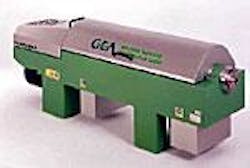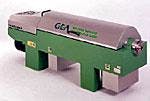Centrifuges Solve Dewatering, Thickening Concerns
The Monroe, MI, wastewater treatment facility provides wastewater collection and processing services to over 17,000 residential and industrial customers in four communities. Belt filter presses were being used for thickening and dewatering, and the resulting sludge was then trucked to a landfill for disposal.
However, the aging belt filter presses, which were about 20 years old, were very high maintenance. According to Dave Brown, Monroe's Operations Supervisor, "there was always something going wrong - belts, bearings, drives - it was a constant problem." A decision was made to study the problem and undertake rehabilitation of the system where indicated.
A five year capital improvement program was launched, and the consulting firm of Ayres, Lewis, Norris & May was hired to study the entire solids handling process, evaluate alternative technologies to replace the aging belt filter presses, and then to evaluate alternative equipment suppliers. Among the alternatives considered were:
- New, covered and enclosed belt filter presses for dewatering
- Rotary drum thickeners
- Decanter centrifuges for both thickening and dewatering.
Based on the engineering firm's recommendations, the facility decided to adopt centrifuge technology for both dewatering and thickening of sludge. One of the primary considerations was odor control. Because the centrifuges are totally enclosed, it was expected that there would be a marked improvement in the environment in the plant.
Visits were made to other municipal wastewater treatment plants where competitive equipment of this type was in use. Ultimately, the consultant recommended the Westfalia Separator CA 755 due in part to the smaller footprint of the machine.
According to Jim Grau of Ayres, Lewis Norris & May, "The Westfalia Separator CA 755 was well-designed for our purposes. The variable speed motor is mounted on top of the decanter, not off to the side, so the footprint is smaller."
Ultimately two CA 755s were put to use, one strictly for dewatering and another that performs dual duties, switching between the dewatering and thickening modes.
According to Dan Stefanski, Director of the Monroe Wastewater Department, the two new decanter centrifuges have proven to be an efficient alternative to belt filter press technology for many reasons.
"The entire sludge dewatering and thickening process now is self-contained so it is cleaner, there is a considerable reduction in odors, and it is better in terms of the operators' working conditions and worker safety," he said.
The decanters are so efficient that under certain flow conditions they only need to run three days a week and still manage the solids inventory of the plant. And the cakes are considerably drier, resulting in a marked improvement in hauling costs.
Other benefits from the change include reduced polymer usage, lower maintenance costs and significantly lower hauling and disposal costs.

